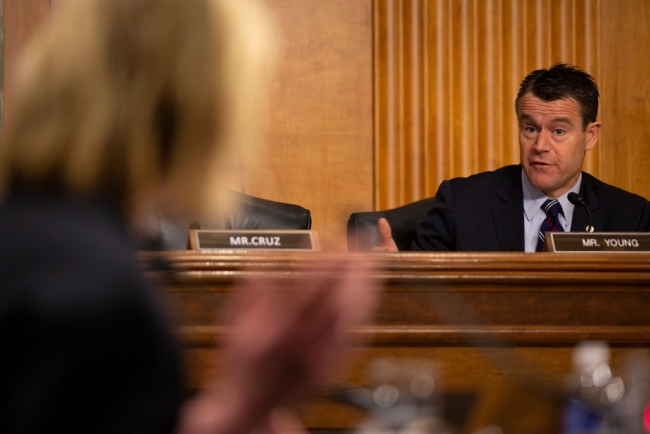You have /5 articles left.
Sign up for a free account or log in.

Senator Todd Young, an Indiana Republican
Getty Images
Senate lawmakers announced legislation Tuesday that they argue will spur the growth of income-share agreements, privately run alternatives to student loans that commit workers to paying back a portion of their future income.
ISAs have received extensive press coverage, thanks to their promotion as an alternative to unmanageable student debt. They’ve yet to catch on widely, though -- in part, supporters argue, because of a lack of clarity surrounding federal law.
Senator Todd Young, an Indiana Republican, and Senator Marco Rubio, a Florida Republican, were joined by Virginia Democrat Mark Warner and Delaware Democrat Chris Coons in rolling out the bill. Young and Rubio had previously introduced legislation. The new Democratic support reflects the growing interest in alternatives to traditional student loans. Coons said the legislation would allow ISA proponents to “proceed safely and with more government oversight.”
But some consumer advocates say regulations on financial products already apply to income-share agreements. And Democrats including Massachusetts senator Elizabeth Warren have warned that the financial instruments carry common pitfalls of private student loans with the “added danger of deceptive rhetoric and marketing.”
The legislation could test whether the negative branding for student debt will motivate lawmakers to embrace a mostly untested financial product. Young said skyrocketing student debt had pushed too many families into financial hardship to pursue a quality education.
“That’s why I have introduced a bill to offer students from all backgrounds with a private -- or philanthropically -- funded, debt-free financing option catered to their own income needs through the use of income share agreements,” he said. “If we strengthen the framework of ISAs, we can help colleges and career and technical schools prepare Americans for rewarding careers, all without any additional cost to taxpayers.”
The legislation would exempt individuals earning less than 200 percent of the federal poverty line from obligations to pay income-share agreements. Under most ISA agreements, students' repayment obligations kick in when they reach a certain income threshold. The bill would also cap payment obligations at 20 percent of workers’ incomes and apply lower caps for longer contracts. And it gives the Consumer Financial Protection Bureau oversight of ISAs and makes them dischargeable in bankruptcy. Federal law doesn't allow student loans to be discharged through bankruptcy.
Anne Kim, the vice president of domestic policy at the Progressive Policy Institute, said the legislation would ensure the market for ISAs “is fair and transparent and puts students’ needs first.”
But Joanna Darcus, a staff attorney at the National Consumer Law Center, said the bill would pre-empt multiple federal and state consumer protections.
“ISAs cannot be properly described as anything other than debt. Legislation like this would actually roll back the existing protections that we have for students when they incur debt,” she said. “We need to be very careful to ensure that we're not adding to the confusion in the higher ed financing market.”
Lawmakers on the Senate education committee are in the midst of negotiating a reauthorization of the Higher Education Act that could include new accountability for colleges’ outcomes on student loans. A Young spokeswoman said that the finance committee would have jurisdiction over ISA legislation but that all potential legislative vehicles would be considered.
Income-share agreements have been most popular with alternative higher ed providers like coding boot camps, the kind of programs that often enroll students who already have a college degree. Only a handful of traditional four-year colleges have offered ISAs themselves, most notably Purdue University, where the Back a Boiler program has been looked to as a model by supporters. Purdue president Mitch Daniels offered an endorsement of the new legislation, saying it’s a necessary framework to expand an option for students “who wish to be protected against the risks of excessive student loans.”
The Trump administration has also indicated an interest in experimenting with ISA arrangements. In May, a top Education Department official suggested the administration could use its experimental sites authority to run a pilot program for federal income-share agreements.
That prompted Warren and House Democrats Ayanna Pressley and Katie Porter to ask Education Secretary Betsy DeVos last month whether the department had considered its legal authority to pursue such an experiment.
“The department should instead focus on pursuing real solutions to the student debt crisis that help student borrowers avoid and escape debt, like fully discharging the loans of defrauded borrowers and improving the abysmal administration of the Public Service Loan Forgiveness program,” the lawmakers wrote.








